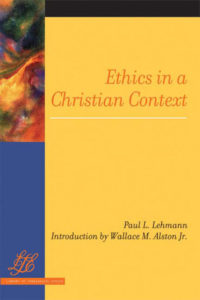 From the Library of Theological Ethics
From the Library of Theological Ethics
In Ethics in a Christian Context, author Paul Lehmann answers the central question posed time and again to Christians throughout the ages: what am I as a believer in Jesus Christ and a member of his church to do? Lehmann argues that while principles for moral action can be rules of thumb, there are no absolute moral norms beyond the general norm of love. Lehmann contends that Christians are to act in every situation in ways that are consistent with God’s humanizing purposes, but what that means changes from context to context and requires strong, faith-shaped discernment.
A 2006 essay by Associate Professor John Drury of Wesley Seminary explains why Lehmann’s view on ethics is unique:
“The uniqueness of Lehmann’s ethical thought is not that he is a contextualist who happens to be Christian, but rather that he moves from his Christian commitments to a contextual ethic. As Lehmann puts it, “It cannot be too strongly stressed that the contextual character of Christian ethics … is derived from the ethical reality and significance of the Christian koinonia. The contextual character of Christian ethics is not derived from an application to the Christian koinonia of a general theory of contextualism.”[i] In this light, one can see that Lehmann is thoroughly contextual: he takes his own context as a member of the community of Christ as his starting point.”
“He moves from theological content to methodological reflection on ethics, not the other way around. His theological reflection does not merely serve his preconceived notion of ethics; rather, he sees the ethical reality through the lens of material theological claims.”
For more information on the publication, click here. To read the complete essay by Drury, click here.
Fellow travelers are scholars, activists, and practitioners that embody the ideals and commitments of the Project on Lived Theology. We admire their work and are grateful to be walking alongside them in the development and dissemination of Lived Theology.
